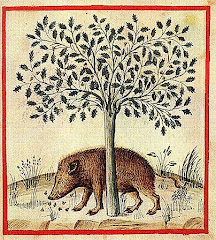
Ongoing efforts at clearing my backlog of Google Alerts has today uncovered just one relic of interest dating back to early last autumn.
In summary, a new study has shown that an extract of Pine bark (named Pycnogenol) can significantly reduce the pain experienced by sufferers of osteoarthritis. The powerful anti-inflammatory effects were felt by subjects after one month of taking the supplement and lasted for up to two weeks after discontinuing. More than a third of subjects were able to reduce their intake of NSAID's, whilst only 8% of the placebo group did the same. What wonderful news for arthritis sufferers and Pine lovers alike.
The pine in question is, as far as I can figure out, the Pinus pinaster or Maritime Pine. Having said that, I found synonyms and cross references for this plant ran far and wide. Even Plants for a Future (Pfaf), my first choice link for plant info, seems to contradict itself a little on its Pinus nomenclature.
At any rate, I have to confess that the Pine-ident I was required to do at college (stating family, genus, species and cultivar for 20 different conifers), was possibly the ident I got the lowest marks on in the entire year and so, assuming that for most purposes we can call a pine a pine, I think it's probably safe for me to generalise just a tad and assume that by and large the medicinal properties in question apply more or less to any of those nice tall conifers that fill their forests with the rich smell of antiseptic resin. Although of course, it would be silly to put that theory into practice so have a look at the Pinus list on Pfaf for a breakdown of a forest of pinetrees and their uses.




















1 comment:
Now having tantelised us with this information about pine and pain relief, you do realise you're going to have to make some salve and try it out on someone and let us know how it works!
Pine isn't something I've worked with nor felt drawn to, but I am about to try some meadowsweet salve which Henriette recommended recently on her blog.
Post a Comment